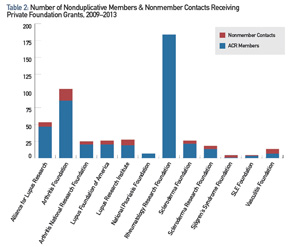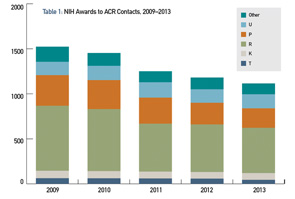It’s critical that rheumatology professionals take note of the decline in NIH funding. Strong research funding attracts the best people to our training programs across the country, showcasing what makes rheumatology the most exciting field of medicine, from discovery to therapeutics. It supports, directly or indirectly, the training of most rheumatologists and health professionals at one point in their careers. If the downward trend in funding continues, it could have serious implications for the future of our subspecialty. We must continue to advocate for the NIH in our work though the Government Affairs Committee and RheumPAC.
Support from Private Organizations
Another focus of the funding analysis was to get a better picture of the support ACR contacts receive from private organizations. From 2009 through 2013, the rheumatology community received 450 awards provided by participating private foundations with a focus on rheumatology or rheumatic diseases, representing 66.1% of the total funding offered by the organizations. As shown in Table 2 (opposite), we are particularly proud to point out that 177 ACR members received a total of 192 research grants from our Foundation, excluding education and training awards, over the past five years. All awards from the Rheumatology Research Foundation are given to the ACR’s members and make up nearly 40% of the awards and grants given to the ACR’s contacts from private foundations during that time frame. The other participating organizations that provided the most funding to ACR contacts were the Arthritis Foundation, which gave awards to 90 contacts, and the Alliance for Lupus Research, which gave awards to 47 contacts.

Understanding Leads to Solutions
This report is just the start of our efforts to fully understand the state of funding for rheumatology research and training. The ACR and the Foundation will continue to collect these data every year in order to paint a clearer picture of the support for our research and track its trajectory. We also will bring together a wide range of stakeholders in rheumatology research for a summit to identify potential gaps in funding and opportunities for collaboration. In the meantime, leaders from both the ACR and the Foundation will continue to meet with officials at various NIH institutes to foster the exchange of ideas and reinforce the importance of supporting rheumatology research. We realize that many fine rheumatology researchers feel they may need to leave the field because they cannot garner the funding needed to sustain their research while supporting themselves and their families. Our hope is that by better understanding the crisis in funding for rheumatology research, we will be able to develop solutions that will help address the shortfalls researchers are facing, continue to advance the field and lead to breakthroughs that improve the health of people with rheumatic diseases.




